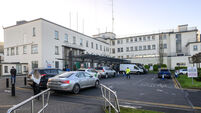Colin Peirce: Fixing hospitals in the Midwest requires a creative, collaborative response

More than 80,000 people attended the emergency department at University Hospital Limerick in 2023. Picture: Dan Linehan
The recent decision by the HSE to switch-off scheduled care across five hospitals of the University of Limerick Hospitals Group (ULHG) was not acceptable.
For the hospitals’ patients and staff, and the region’s wider population of more than 400,000 people, it raises understandable questions, starting with “was this approach necessary?”
















